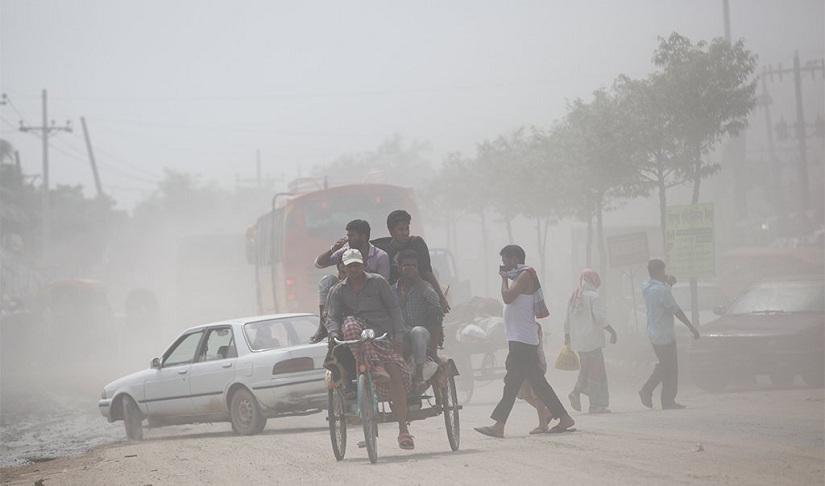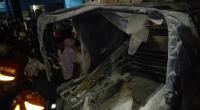 Dhaka's air pollution has been worsening, and Swiss company IQ Air Visual plus Greenpeace named the city the world's second-most polluted capital city in 2018.
Dhaka's air pollution has been worsening, and Swiss company IQ Air Visual plus Greenpeace named the city the world's second-most polluted capital city in 2018.
Meanwhile, Dhaka ranked sixth for the worst air in the world with a score of 151 on the real-time US Air Quality Index (AQI), Sunday (May 26). Its air quality was described as "unhealthy."
Dhaka, the capital of one of the most densely-populated countries in the world, consistently battles with terrible air pollution, making it difficult to breath. Five of the top 10 causes of death in Bangladesh are related to air pollution.
But what if there was a gadget that could purify the air one breathes?
Dhaka Tribune met with independent innovator Pritom Chowdhury, managing director of TechGeeks Ltd, a Bangladeshi startup that—among other things—is dedicated to finding a solution to solving the air pollution crisis.
TechGeeks has invented an intelligent air purifier called AirMate, a device that allows the person wearing it to inhale polluted air, and have it purified by the filter.
"We are working to advance healthcare by coming up with an innovative, intelligent and low-cost purifying device," Pritom told the Dhaka Tribune. "The filter in the device will constantly purify the air around a person, without needing to cover the person's entire face.
"The device is so convenient, it can be fixed to one's shirt collar, and it will do its work," said Pritom.
How does AirMate work?
The gadget has a gas detector sensor to detect harmful gases, and a three-layer filtration system to provide 99.98% accuracy while detecting harmful gases for purification, Pritom said.
"Meanwhile, a mobile app will continuously notify the user about the air status, in real time," he added.
Pointing out that Dhaka ranks as the second-worst city on the Air Quality Index, and air pollution causes people to fall sick more often—plus contract respiratory diseases—Pritom said: "In a country where: people smoke freely, construction sites do not abide by pollution-related rules, industry and vehicles release poisonous black smoke, what could be the better solution than a wearable, electronic, air-purifying device that does not cover the whole face, yet effectively cleans the air of viruses, bacteria and deadly infections?"
The self-funded project advanced to the semi-finals of Global Innovation through Science and Technology (GIST) 2019 a startup business competition sponsored by the US Department of State; but did not continue to the expert review stage.
'Investors need to come forward to fund projects like ours'
Without the government's aid, it will be difficult for TechGeeks to invest as a startup company, Pritom said.
"We need to increase awareness among the tech investors to invest in hardware development," he said. "Their mindset needs to change with regard to investing; the customers also need to think of buying products made in their country."
Pritom said Bangladesh lacks manufacturing plants. "However, I believe the government's Hi-tech Park initiative will help in the future.
"The investors also need to come forward to fund projects like ours, which can have a potential market for millions," he added.
Highlighting that there is a market of 3 billion customers for AirMate, the young entrepreneur said: "If the market is just narrowed to hospitals, medical professionals, and people with respiratory problems, the estimated market—based on previous numbers—is for 10 million people in Bangladesh, with an increasing rate of around 10,000 new customers per year."
Pritom added: "With an increasing rate of around 10,000 new customers, the approximate sale prediction for five years for the above-mentioned market segment will be: Tk 1,450 crore or around $172 million."
 Others
Others
30901 hour(s) 28 minute(s) ago ;
Morning 08:22 ; Friday ; Apr 26, 2024
Bangladeshi startup developing project to combat air pollution
Send
Afrose Jahan Chaity
Published : 09:40, May 27, 2019 | Updated : 09:42, May 27, 2019
Published : 09:40, May 27, 2019 | Updated : 09:42, May 27, 2019
0 ...0 ...
/pdn/
Topics: Top Stories
- KOICA donates medical supplies to BSMMU
- 5 more flights to take back British nationals to London
- Covid19: Rajarbagh, Mohammadpur worst affected
- Momen joins UN solidarity song over COVID-19 combat
- Covid-19: OIC to hold special meeting
- WFP begins food distribution in Cox’s Bazar
- WFP begins food distribution in Cox’s Bazar
- 290 return home to Australia
- Third charter flight for US citizens to return home
- Dhaka proposes to postpone D8 Summit
Unauthorized use of news, image, information, etc published by Bangla Tribune is punishable by copyright law. Appropriate legal steps will be taken by the management against any person or body that infringes those laws.
Bangla Tribune is one of the most revered online newspapers in Bangladesh, due to its reputation of neutral coverage and incisive analysis.
F R Tower, 8/C Panthapath, Shukrabad, Dhaka-1207 | Phone: 58151324; 58151326, Fax: 58151329 | Mob: 01730794527, 01730794528


